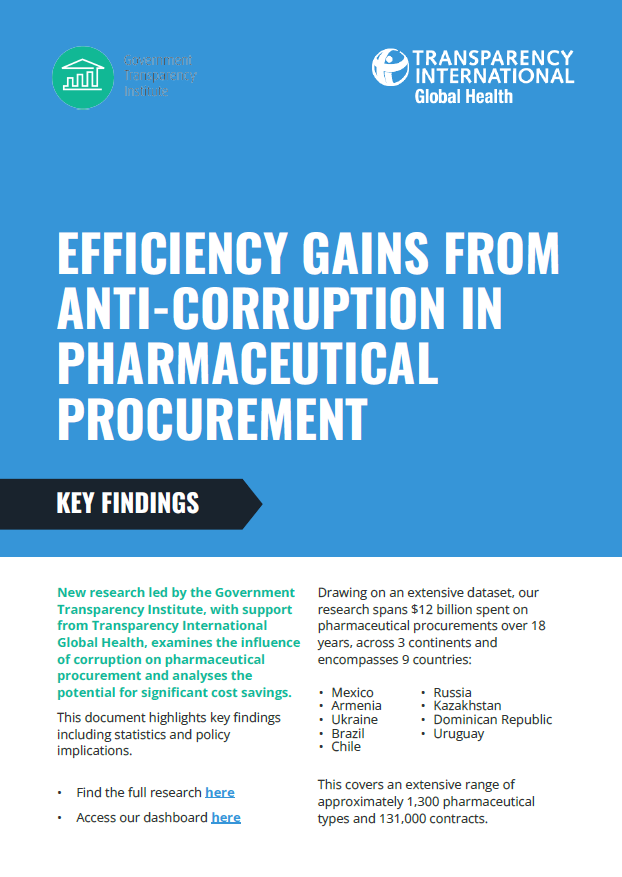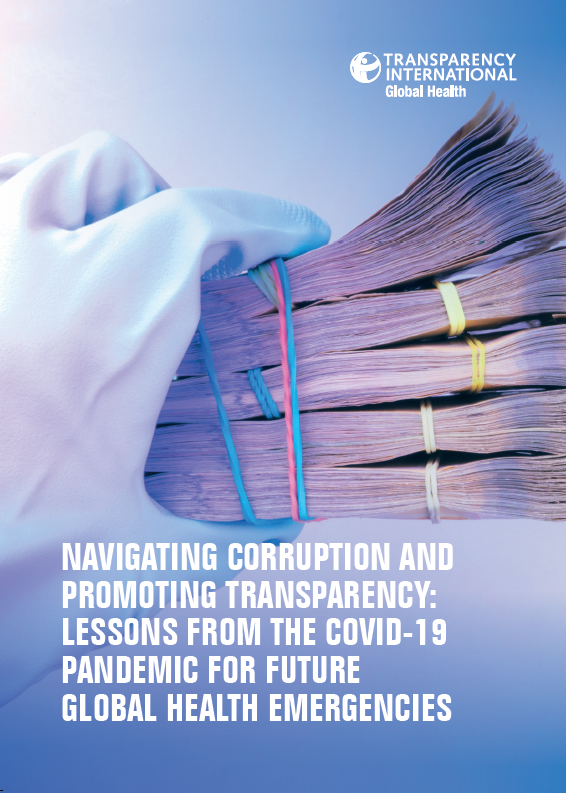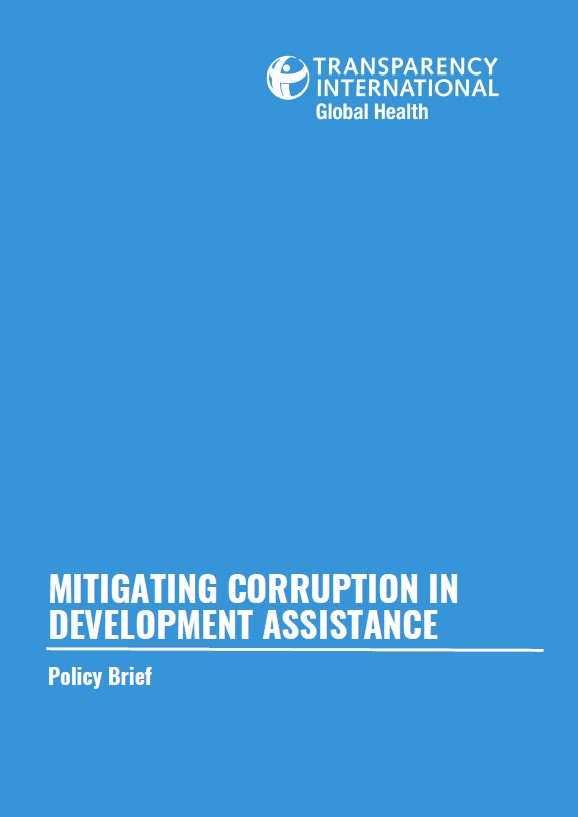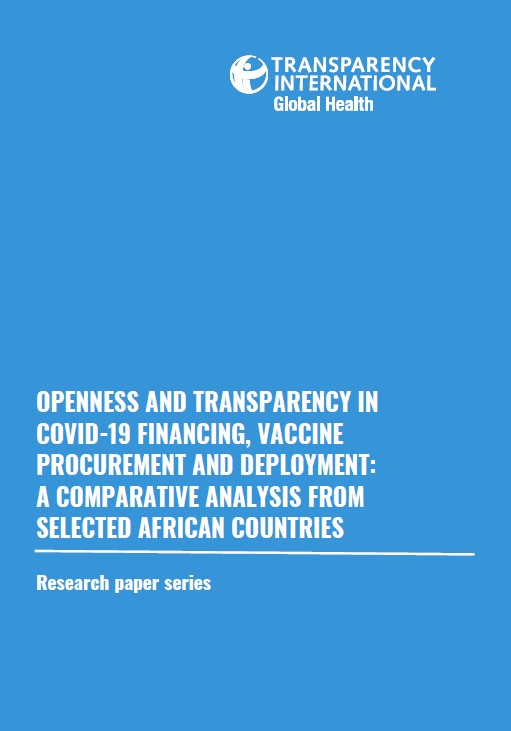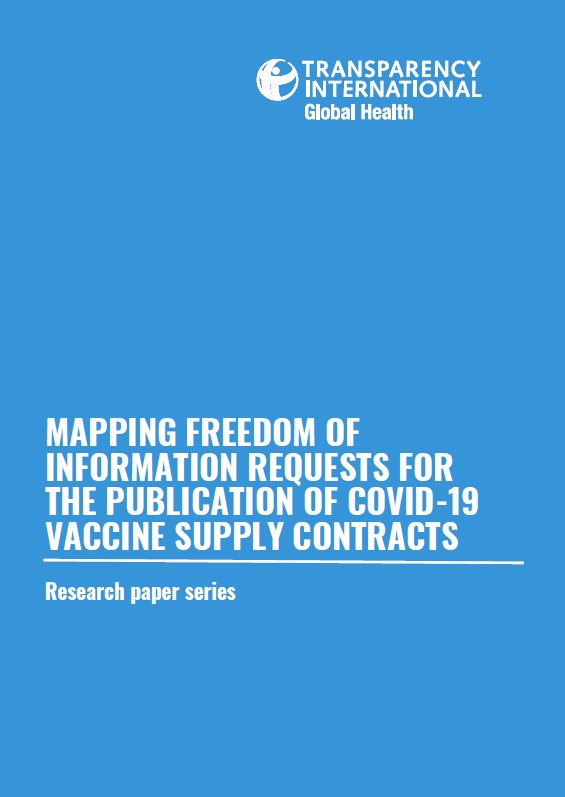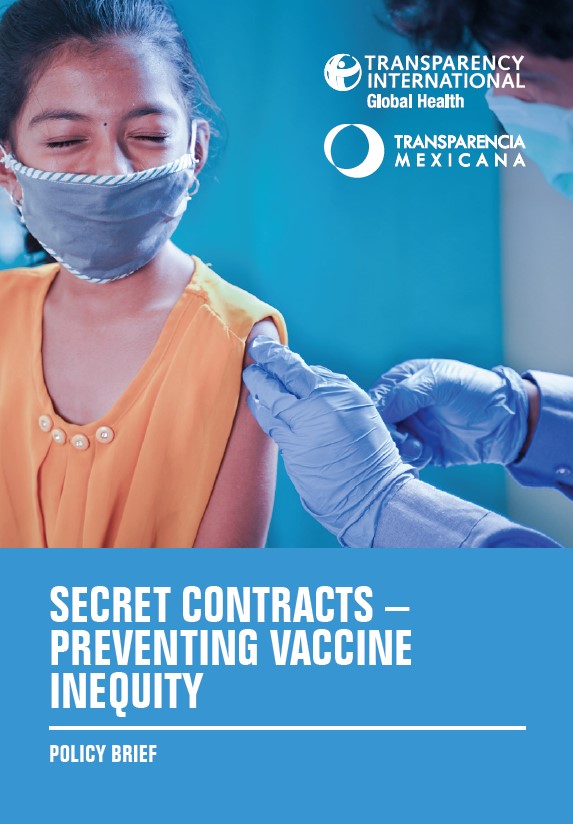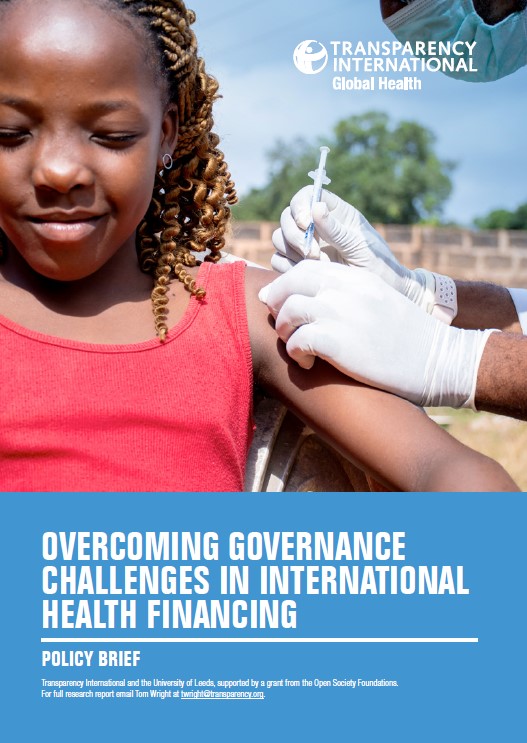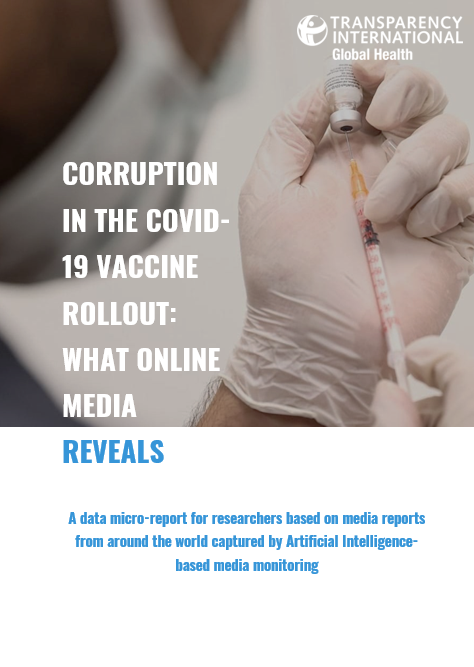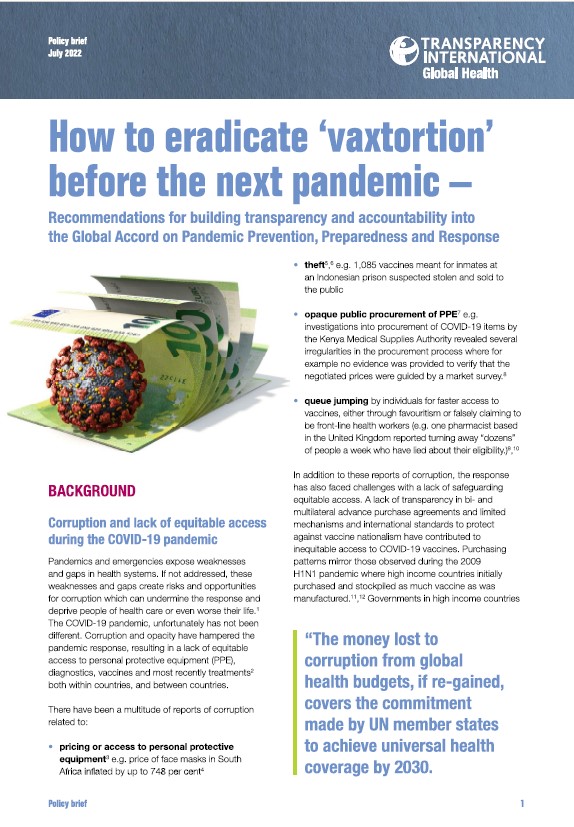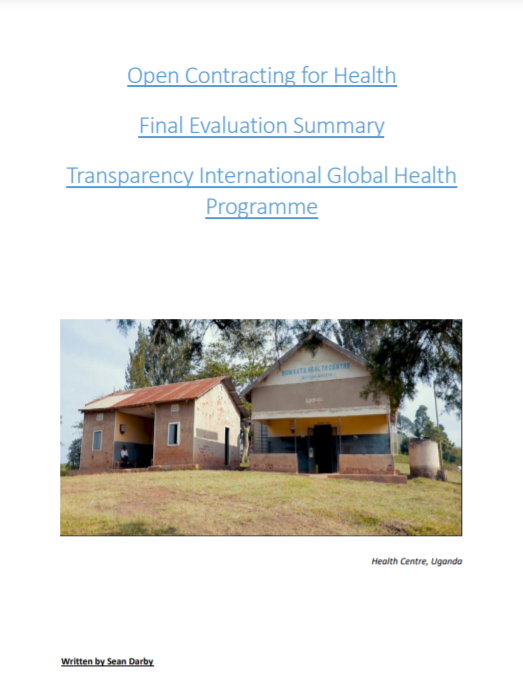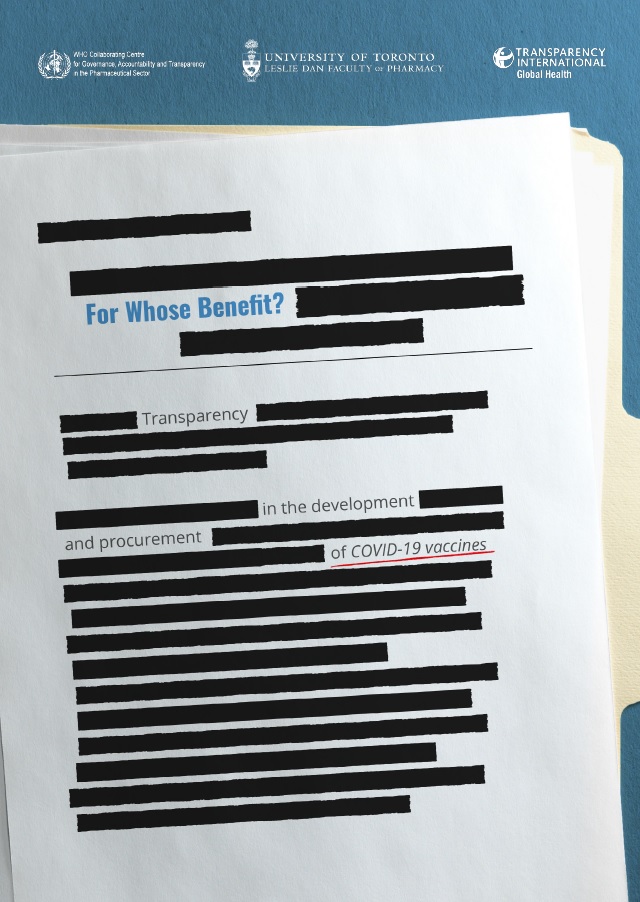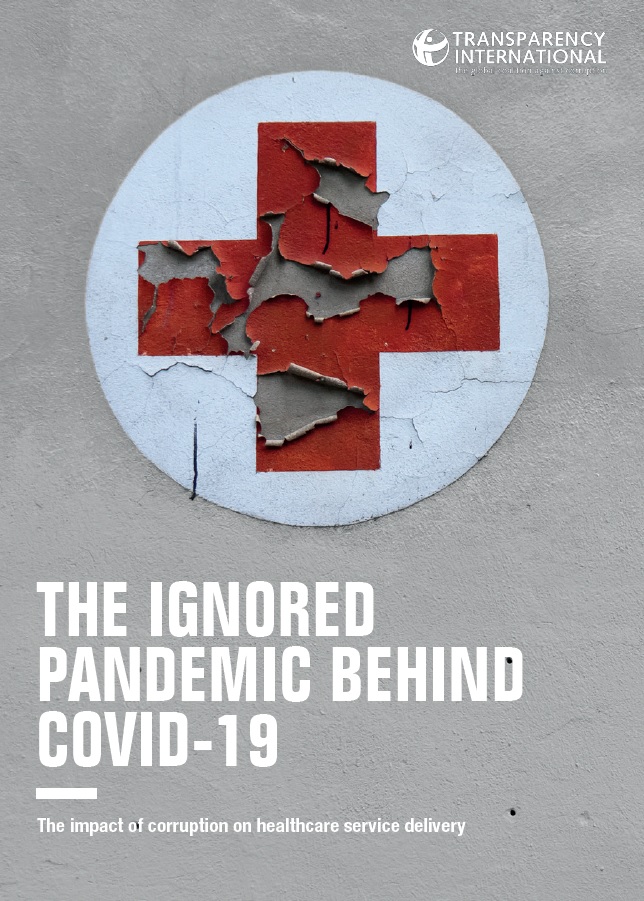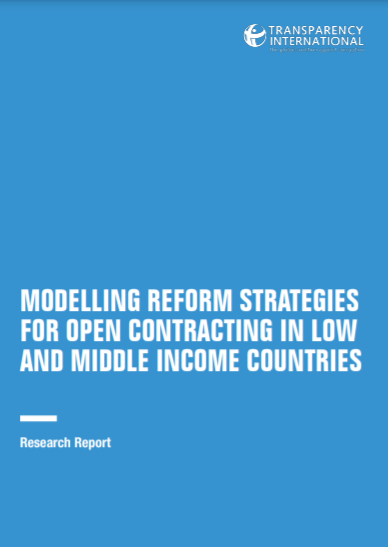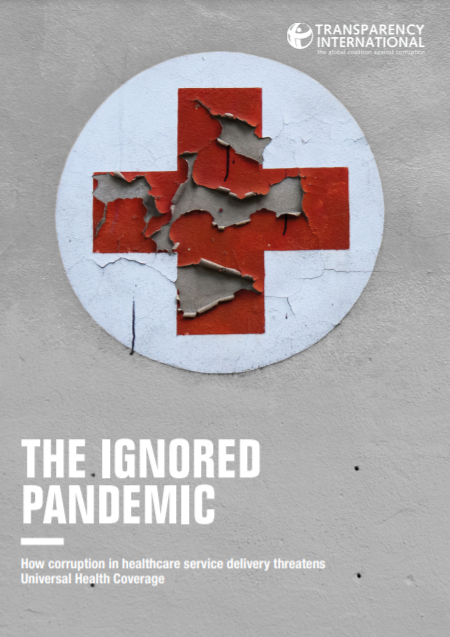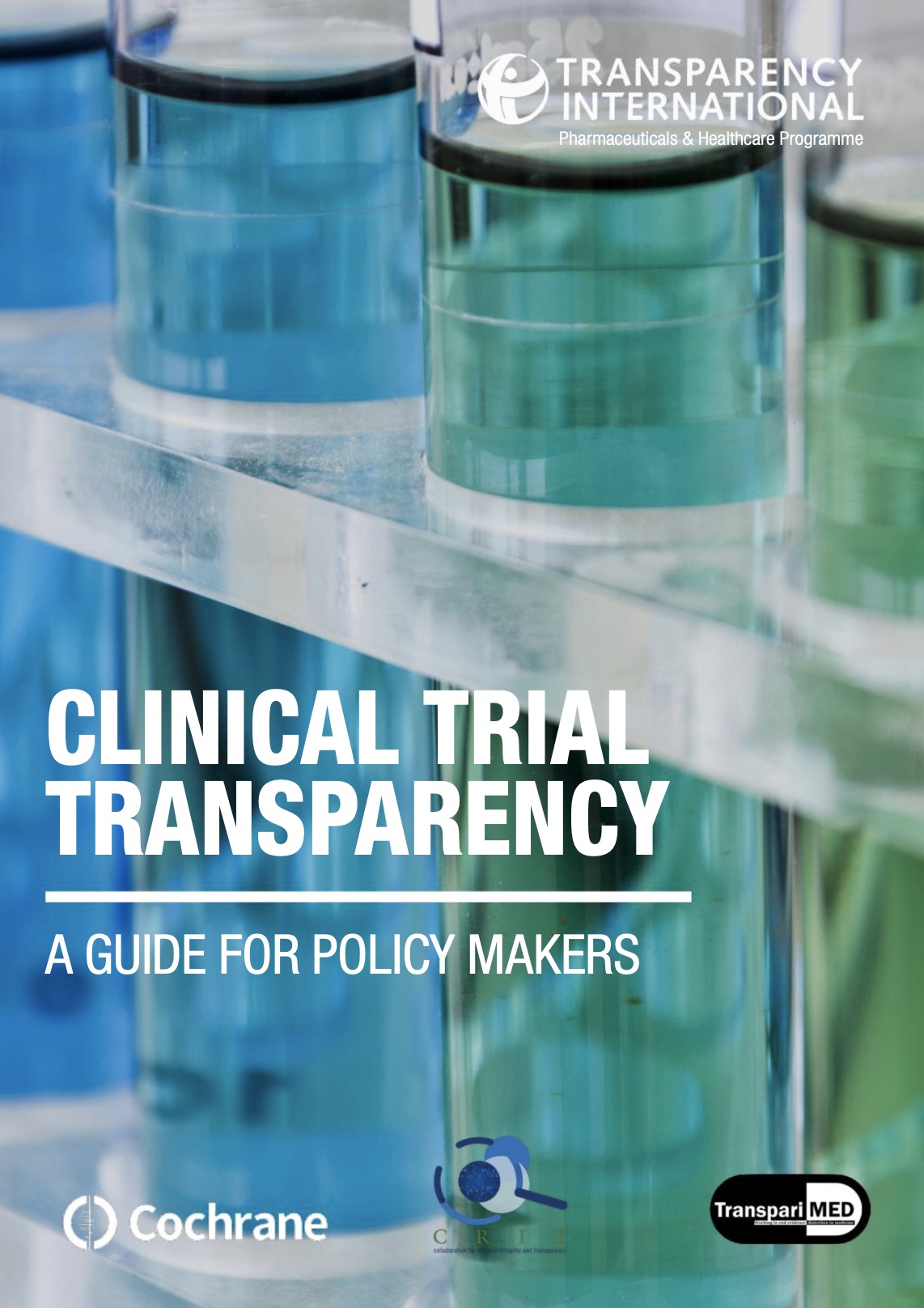Publications Archive
August 31, 2023
New research led by the Government Transparency Institute, with support from Transparency International Global Health, examines the influence of corruption on pharmaceutical procurement and analyses the potential for significant cost savings. Read the fact sheet here.
Read Publication >July 7, 2023
This report explores the challenges and impact posed by corruption and transparency issues in health emergencies. In examining these challenges, the report makes a series of policy recommendations designed to ensure more robust, efficient, and equitable responses to future health emergencies. Lessons_from_Covid-19_Pandemic_Paper_v6.1_digital
Read Publication >March 31, 2023
In the health sector, there is an increasing emphasis on constructing stronger and more resilient systems that can effectively respond to emergencies. However, the absence of embedded anticorruption, transparency, and accountability (ACTA) measures will undermine this objective. Accordingly, there is a need to identify measures and instruments that both the funders and international actors such…
Read Publication >March 31, 2023
Covid-19 brought unprecedented global turmoil leading to millions of infections and deaths. Public procurement has been a core element of government responses to the pandemic. Extant evidence has, however, shown that public procurement is generally prone to corruption, notably pharmaceutical and health-sector related procurements which historically have been associated with higher corruption risks. Find out…
Read Publication >March 31, 2023
Freedom of Information Requests (FOIRs) provide the window of access to COVID-19 vaccine supply contracts in times of crisis. Yet for COVID-19 supply contracts, FOIRs have recorded limited success due to barriers which have either been legal, institutional, political or a combination of all of these. Find out more and hear our recommendations in our…
Read Publication >December 8, 2022
The COVID-19 pandemic has demonstrated how access to urgently needed health resources, such as vaccines, can be obstructed by opaque procurement processes during health emergencies, to the detriment of lower-income nations. Our latest policy brief, launched on the second anniversary of the first approved COVID-19 vaccine being administered, provides recommendations to be studied in planning…
Read Publication >September 28, 2022
Weak civic input and oversight threatens to undermine the prospects of the World Bank’s Pandemic Preparedness and Response Financial Intermediary Fund. This policy brief highlights how these and other challenges can yet be averted.
Read Publication >September 1, 2022
The distribution of the COVID-19 vaccine has not come without corruption risks. Research on the prevalence and drivers behind vaccine-related corruption, however, is so far scarce. To close this gap, Transparency International Global Health is publishing a series of micro-reports examining the nature of different corruption types in the vaccine rollout. We do this using…
Read Publication >August 31, 2022
Scoping report FIF governance challenges TI_UoLThe failures of the international COVID-19 response highlighted key gaps in Pandemic Preparedness and Response (PPR) at global, regional and national levels. As a result, calls are being made for additional funding of $10.5 billion per year to adequately strengthen the global PPR architecture. In response to these calls, the…
Read Publication >July 6, 2022
The Transparency International Global Health Programme has published a policy brief with key recommendations for how member states can ensure we learn from COVID-19. We are calling for transparency and accountability to be built into the global agreement being drafted in 2022-23 to prepare future pandemics. Policy brief published here ahead of the intergovernmental negotiating…
Read Publication >May 30, 2022
In 2021, 11 billion COVID-19 vaccine doses were produced, enough to fully vaccinate every adult in the world. Yet, despite such tremendous advances in development and production of vaccines, there is great inequity in the global distribution of vaccines. Whilst many high-income countries are discussing fourth doses, only 16.19 per cent of people in low-income…
Read Publication >December 22, 2021
As the first COVID-19 vaccinations were rollout out at the end of 2020, there was great hope that 2021 would be the year in which the world managed to contain COVID-19, and life could resume as normal. However, even before the emergence of the Omicron variant it was clear that for many that would not…
Read Publication >August 4, 2021
Transparency International Global Health Programme, with support from the UK’s Foreign, Commonwealth & Development Office (FCDO), concluded the Open Contracting for Health (OC4H) project in July 2021. The project, which ran from 2017 operated across Nepal, Kenya, Uganda, Zambia and South Africa, with TI’s partner chapters implementing the in country work. The project sought to improve health…
Read Publication >May 25, 2021
The COVID-19 pandemic has required an unprecedented public health response, with governments dedicating massive amounts of resources to their health systems at extraordinary speed. Governments have had to respond quickly to fast-changing contexts, with many competing interests, and little in the way of historical precedent to guide them. Download the report here. Download the policy…
Read Publication >December 17, 2020
In 2019, Transparency International Health Initiative launched its report The Ignored Pandemic: How corruption in health service delivery threatens Universal Health Coverage (UHC). It documented the drivers, prevalence, and impact of corruption on service delivery, showing how it threatens people’s ability to exercise their right to health and countries’ capacity to provide UHC. Since the…
Read Publication >November 6, 2020
This report aims to evaluate the effectiveness and fit of open contracting reforms to LMIC contexts and to provide recommendations on how and when countries should pursue open contracting reforms. This objective was broken down into the following questions on reform outcomes and reform drivers: 1. How advanced and comprehensive is the legal framework for…
Read Publication >March 19, 2019
Universal health coverage, meaning that all individuals and communities can access essential quality health services without suffering financial hardship, has become the top priority of the World Health Organisation. Achieving the ambitious goal of universal health coverage will require more resources, and the better use of existing resources. At the same time, efforts to achieve…
Read Publication >December 12, 2017
Clinical trials are a key driver of medical innovation and progress, but scientists have known for decades that the existing evidence base on drugs and medical devices is incomplete and biased due to the opacity of clinical trials. The medical community, the private sector and public bodies all lack access to reliable information on the…
Read Publication >May 4, 2017
“Business Principles for Promoting Integrity in the Pharmaceutical Sector in Latin America” (Pharma Integrity Principles), is a set of new principles focused on strengthening ethical standards across the pharmaceutical sector in Latin America, promoting integrity and ethical business practices. The Pharma Integrity Principles for Latin America aim to promote integrity in the pharmaceutical sector and guide…
Read Publication >January 30, 2017
TI-PHP’s new report “Making the Case for Open Contracting in Healthcare Procurement” examines the utility of open contracting in healthcare procurement. The process relies on governments to disclose procurement information to businesses and civil society improves stakeholders’ understanding of procurement processes increasing the integrity, fairness and efficiency of public contracting. In several countries, including…
Read Publication >January 17, 2017
Transparency International UK’s Pharmaceuticals & Healthcare Programme provides a response to NHS England’s Managing Conflicts of Interest in the NHS: A Consultation. Click here to access the consultation.
Read Publication >October 7, 2016
From the politician to the patient, corruption is part of doing business in the healthcare sector all over the world. Corruption is pervasive within healthcare to the extent it has become normalised. Information collected from a literature review, key informant interviews, and a survey with healthcare professionals was used to identify the main corruption types in…
Read Publication >September 26, 2016
11 true stories about very different people, in very different contexts. But with one common message: change is always possible, even when the odds seem stacked against you. From India to Zimbabwe, these are stories about standing up and fighting back against corruption in health.
Read Publication >August 5, 2016
The Transparency International’s Pharmaceuticals & Healthcare Programme funds national and local projects conducted by TI chapters worldwide. In this project TI Nepal examined the Government of Nepal’s distribution of seventy medicines free of cost to all of its citizens. The research process included a survey to collate the experiences and perception of local citizens and…
Read Publication >June 3, 2016
Within the health sector, pharmaceuticals stands out as sub-sector that is particularly prone to corruption. There are abundant examples globally that display how corruption in the pharmaceutical sector endangers positive health outcomes. Whether it is a pharmaceutical company bribing a doctor for prescribing its medicines irrespective of a health need or a government employee facilitating…
Read Publication >July 2, 2014
Building on 20 years of experience in this and other sectors, Transparency International UK is taking up the challenge of analysing, understanding and combating corruption in this vital sector. We aim to do so through a coordinated international initiative, working in close coalition with Transparency International national chapters throughout the world and other partners from the…
Read Publication >